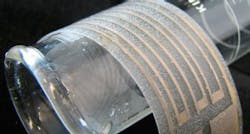Particle-free silver ink can enable flexible optoelectronics
Champaign, IL--Materials scientists at the University of Illinois have created a non-particle-based silver ink for printing high-performance electronics on ubiquitous, low-cost materials such as flexible plastic, paper, or fabric substrates.1 The ink results in printed flexible electrodes that have the same electrical conductivity as that of bulk silver. This is good news for researchers creating flexible displays, optoelectronic medical patches, sensors, and photovoltaics.
The new ink is a transparent solution of silver acetate and ammonia. The silver remains dissolved in the solution until it is printed, and the liquid evaporates, yielding conductive features after annealing at 90°C. The resulting features have a conductivity of greater than 10**4 Siemens/cm (1 Siemens = 1/ohm) at room temperature, which is equivalent to that of bulk silver. The conductors are stable, and the ink is much easier to make and use than particle-based silver inks.
Most existing conductive inks rely on metal microparticles suspended in the ink. The reactive ink has several advantages over particle-based inks. It is much faster to make: A batch takes minutes to mix, according to S. Brett Walker (one of the researchers), whereas particle-based inks take several hours and multiple steps to prepare. The ink also is stable for several weeks.
The reactive silver ink also can print through 100-nm nozzles, an order of magnitude smaller than particle-based inks, an important feature for printed microelectronics. Moreover, the ink’s low viscosity makes it suitable for inkjet printing, direct ink writing, or airbrush spraying over large, conformal areas.
“For printed electronics applications, you need to be able to store the ink for several months because silver is expensive,” says Walker. “Since silver particles don’t actually form until the ink exits the nozzle and the ammonia evaporates, our ink remains stable for very long periods. For fine-scale nozzle printing, that’s a rarity.”
“We are now focused on patterning large-area transparent conductive surfaces using this reactive ink,” says Jennifer A. Lewis (the other researcher).
The U.S. Department of Energy and the National Science Foundation supported this work.
REFERENCE:
S. Brett Walker and Jennifer A. Lewis, J. Am. Chem. Soc., publication date (Web): January 5, 2012; DOI: 10.1021/ja209267c
About the Author
John Wallace
Senior Technical Editor (1998-2022)
John Wallace was with Laser Focus World for nearly 25 years, retiring in late June 2022. He obtained a bachelor's degree in mechanical engineering and physics at Rutgers University and a master's in optical engineering at the University of Rochester. Before becoming an editor, John worked as an engineer at RCA, Exxon, Eastman Kodak, and GCA Corporation.

